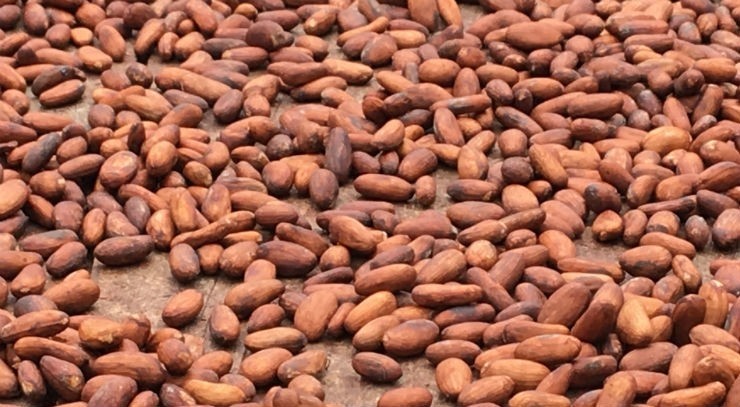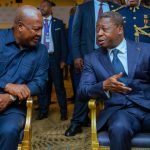Financial economist Professor Lord Mensah has cautioned that Ghana may not benefit significantly from economic spillovers under the second term of U.S. President Donald Trump, primarily due to the country’s ongoing debt crisis and economic challenges.

In an interview with Citi Business News, Professor Mensah explained that while Republican administrations historically coincide with periods of economic growth in the U.S., Ghana’s current financial position marked by an unsustainable debt burden could prevent the country from leveraging any potential economic gains from a Trump-led government.
Professor Mensah emphasized that the United States, under Trump, will likely focus on policies that prioritize mutual economic benefit in bilateral relationships.
However, Ghana’s high levels of debt could make it a less attractive partner for business deals or investment from American companies.
“With Ghana’s situation now, we are not in a good position to reap business benefits from America. No country would be eager to engage with us on a business level when our financial standing is not favorable,” he remarked.
He further added, “Donald Trump will not encourage giving aid or freebies as the Democrats would, but his approach to foreign relations and trade will be centered on mutual business interests.
If business transactions do occur between the U.S. and Ghana, it will likely be on terms that are not in our favor, especially given the country’s debt load.”
Professor Mensah also pointed out that Trump’s focus on business and market-driven solutions could limit opportunities for Ghana to attract the kind of financial support it would need.
Instead of foreign aid, which the Biden administration and other Democrat-led governments are more likely to provide, Trump’s policy agenda would focus on trade, investment, and economic growth, with countries expected to pull their weight in business deals.
“Trump’s policies often favor investment and business, but the question is whether Ghana’s current economic condition will enable us to engage in such transactions.
Countries with robust economies and fewer financial constraints are better positioned to benefit from such a business-oriented U.S. approach,” he added.
This caution from Professor Mensah follows Donald Trump’s recent victory in the fiercely contested 2024 U.S. presidential elections. Trump, now securing his second term in office, has vowed to prioritize economic growth, reduce taxes, and focus on strengthening the U.S. economy.
His administration is also expected to push for comprehensive immigration reforms and tax cuts aimed at stimulating growth, which could reduce foreign investment in countries like Ghana that are struggling to meet fiscal requirements.
While the re-election of Trump is seen as a potential economic boost for the U.S. and some of its allies, Ghana’s current financial constraints and high debt levels may limit its ability to capitalize on the growth expected in U.S. markets under the Trump administration.
As a result, Ghana may have to look elsewhere for economic assistance and investment, particularly in sectors that are less reliant on external funding, such as agriculture, manufacturing, and renewable energy, where international collaboration could prove more fruitful despite the country’s financial challenges.
The outlook remains uncertain for Ghana, as it navigates the impact of both global economic shifts under Trump’s leadership and its internal struggles with managing the nation’s debt and fiscal policy.
























































![[FREE FREE MONEY] Predict and Win a Guaranteed GH¢200 From Us EVERY WEEK](https://wordpress.ghanatalksradio.com/wp-content/uploads/2022/02/Predict-and-Win-Final-09-03-2021-218x150.jpg)
![[Predict & Win – 8th/Oct.] WIN A Guaranteed ¢200 From Us This Week](https://wordpress.ghanatalksradio.com/wp-content/uploads/2021/10/maxresdefault-16-218x150.jpg)
![[Predict & Win – 2nd] WIN A Guaranteed ¢200 From Us This Week](https://wordpress.ghanatalksradio.com/wp-content/uploads/2021/09/maxresdefault-50-218x150.jpg)
![[Predict & Win – 25th] WIN A Guaranteed ¢200 From Us This Week](https://wordpress.ghanatalksradio.com/wp-content/uploads/2021/09/maxresdefault-36-218x150.jpg)
![[Predict & Win – 18th] WIN A Guaranteed ¢200 From Us This Week](https://wordpress.ghanatalksradio.com/wp-content/uploads/2021/09/maxresdefault-23-218x150.jpg)







![[National cathedral] See full list of churches that have contributed since 2018](https://wordpress.ghanatalksradio.com/wp-content/uploads/2020/09/Ghana-National-Cathedral-GhanaTalksRadio-100x70.jpg)



